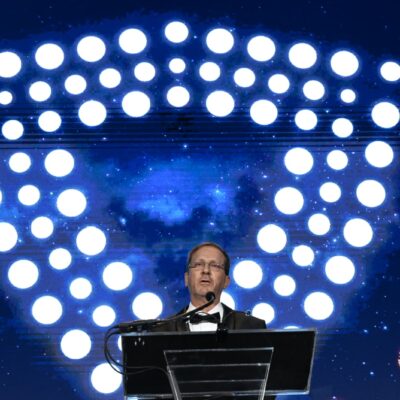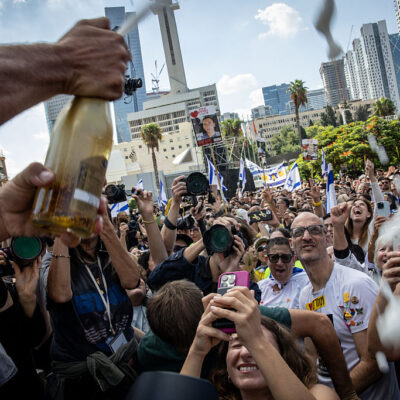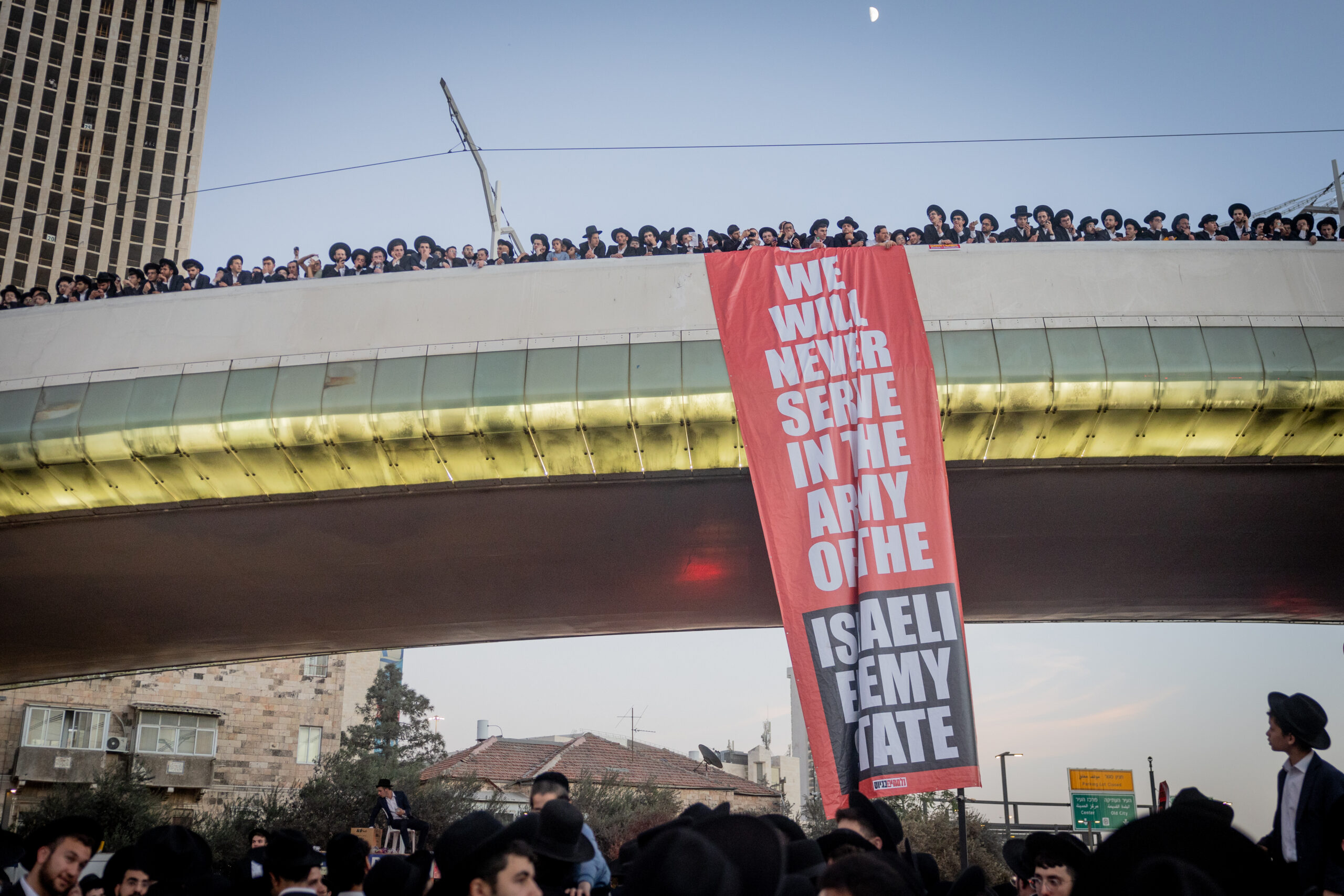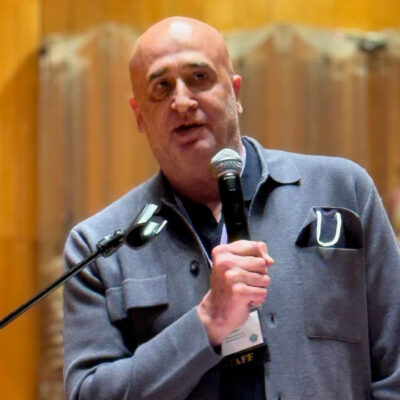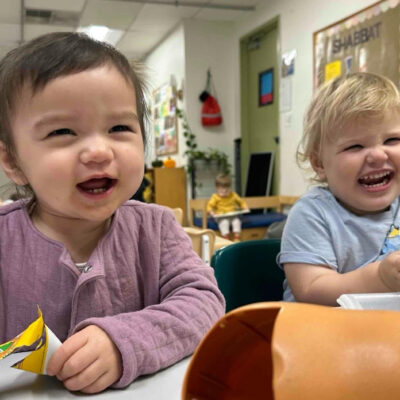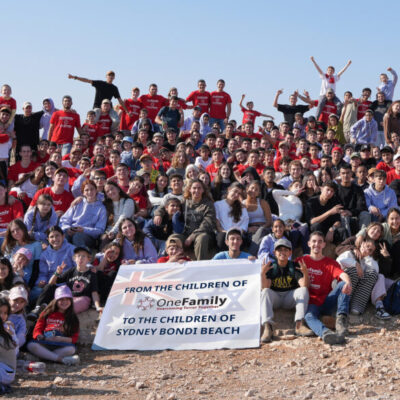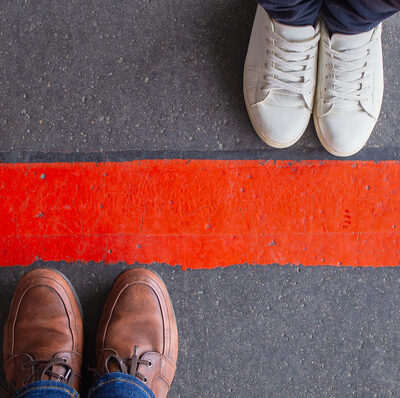west coast moves
Repair the World Fellow welcomed to Los Angeles in federation partnership
The fellowship is a mix of AmeriCorps and a peer-to-peer model more similar to Moishe House or Hillel, and enables fellows to serve full-time for two years, RTW’s chief strategy officer told eJP

Repair the World event with the Greater Federation of Los Angeles.
With the sounds of the Venice boardwalk in the background and a view of the Pacific Ocean at sunset, about 40 people from the Los Angeles Jewish community and beyond sipped specialty cocktails and snacked on bourekas on the rooftop deck at the BAR Center at the Beach. They were there to learn about the launch of Repair the World’s local fellowship and meet Cate Mandel, who was finishing her first week as the program’s first Repair the World fellow. Attendees also assembled backpacks for students in need, filling them with school supplies, as part of the organization’s Backpacks for Education Equity national campaign.
The Repair the World Fellowship is a mix of AmeriCorps and a peer-to-peer model more similar to Moishe House or Hillel, and enables fellows to serve full-time for two years, RTW’s chief strategy officer, Kate O’Bannon, told eJewishPhilanthropy. Run in partnership with the Jewish Federation of Greater Los Angeles, the fellowship connects the fellow (ages 21-26) with local nonprofit partner organizations for two-year stints working full-time. Fellows receive an annual stipend ($25,000-$36,000 a year, depending on location) from Repair to cover living expenses, as well as health and other benefits to enable them to focus on their work — meeting with local partners, planning local programs and engaging in the Jewish community toward social change and Jewish meaning.
“When the pandemic started and we saw differences in experiences of young adults especially, with delays in college, being at home more and having more time and wanting to be active, it was evident that the volunteer initiative that we had before needed to change,” said Melissa York, director of outreach at the L.A. federation. “The opportunity to partner with Repair, who had a model of this service corps [for ages 18-29] and then the fellowship to really engage young adults in service, was really attractive to us to be able to expand the footprint of service in L.A. through the federation.”
Through this continued partnership, which includes Mandel as the Los Angeles-based fellow, York added, the federation will apply a deeper learning lens to its service opportunities.
“One of the fun things with the federation in particular is, for us, when we talk about service at Repair, it’s not just about the actual hands-on action — the showing up at the food kitchen or packing the backpack — but it’s really about the service learning that comes around the action — the Jewish learning and the reflection,” O’Bannon said. RTW will support the federation in building the service learning component, she added, “so that they can strengthen and expand the work that they’ve been doing already with adding on that educational component, which, the research shows us, [is] what keeps young people coming back to serve and also coming back to engage in Jewish life.”
Over the course of their first year, a fellow may affect hundreds through peer engagement, O’Bannon estimated. “They’re spending about 50% of their time serving alongside different nonprofit organizations,” she said, “and the other part of their time is thinking about recruiting their peers to serve alongside them, both through community building and through attending different types of events and creating programming to engage people.”
RTW and the federation started their partnership in the summer of 2020, launching a part-time service corps; Repair had started other such service corps nationally in previous years, but the new initiative specifically engaged the issues and needs on the ground in L.A.. For instance, O’Bannon said, with so many people in the greater L.A. area experiencing homelessness, that emerged as a pressing local need, and several fellowship service partners will be those who are actively working with or adjacent to the issue.
“We wanted young Jews to be able to take actions and support their neighbors and show up for the exacerbated needs that were happening for service [during the pandemic],” O’Bannon said.
The partnership with the federation is “crucial,” O’Bannon added, noting that the fellowship will build on the success of the part-time service corps, as well as on federation’s outreach and engagement in the local landscape.
During fellows’ volunteer commitments to local organizations, they learn more about the local community, develop event-planning skills, learn about the pace of nonprofit life and build a nuanced racial justice lens as their service is accompanied by Jewish learning, issues, education or reflection.
“Our design comes from that dual impact — both the participant experience, their connection to Judaism and ongoing commitment to service, as well as ensuring that the service they’re doing is actually meeting needs and is supporting the nonprofit partners…They’re using identifying needs from those partners to understand where their services as needed, and ensuring that the fellows themselves have a really strong connection to Jewish life, Jewish community and broader community,” O’Bannon said.
“There’s so much need,” York added. “It keeps getting bigger. We need to get the word out to the community of how they can be of help…what we’re both looking to create is more opportunities,” she said.

 Add EJP on Google
Add EJP on Google

